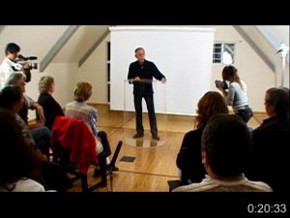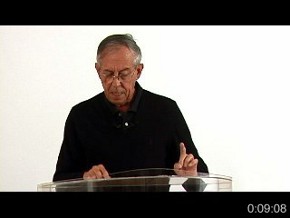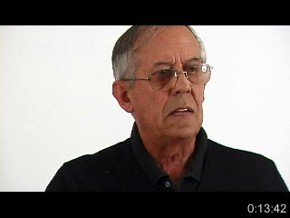Comentarios de Silo - Centro de Estudios, 2008 - Parque Punta de Vacas
El Humanismo
Confío que en los próximos meses nuestras reflexiones puedan llegar no solamente a los parques principales ubicados en distintos continentes, países y regiones, sino a otros más pequeños y también a todas las Salas, Salitas y locales a los que se acerca tanta gente querida.
Aprovecho la oportunidad de llegar a todos los puntos en que se congrega este conjunto humano que hace del Mensaje una referencia profunda. Pero, es bueno destacar, a estos lugares concurre no solamente gente que adhiere a este espiritual, vaporoso y desorganizado Mensaje, sino también aquellos organizados miembros del Movimiento Humanista que trabajan esforzadamente en Humanizar la Tierra. Es a estos últimos a quienes me dirijo especialmente en esta ocasión. Por supuesto, no debo ni puedo opinar sobre el funcionamiento o las diversas actividades que despliega el Movimiento Humanista, pero tampoco puedo dejar de alentar esta colosal empresa que se requiere tan fuertemente en las circunstancias actuales. El mundo, más que en otros momentos está necesitando al Humanismo y nosotros estamos necesitados de Humanismo porque claramente nos urge la humanización progresiva del mundo.
Quiero destacar la necesidad de la acción humanista en diferentes medios culturales y en diversos estratos poblacionales, porque sucede, inversa y desgraciadamente, que los acontecimientos están marcando un desborde de la violencia en todos los campos y un deterioro de toda referencia en los individuos y los pueblos. No es ocioso resaltar que el Humanismo Universalista tiene hoy la posibilidad de crear conciencia y acción no violenta y constituirse en referencia para amplios sectores de la población mundial.
Es claro que el Humanismo para ser eficaz debe contar con un Movimiento organizado, participativo y flexible, que dé especial importancia a la difusión de sus ideas y acciones. Así pues, el Movimiento Humanista debería aclarar en sí mismo sus rasgos fundamentales y al mismo tiempo, esclarecer a los organismos a los que da origen e inspiración. Organismos sociales, culturales, políticos y frentes de acción que se consideran humanistas, deberían alinearse en sus planteamientos básicos al tiempo que siguen una estrategia general de lo diverso y de lo convergente.
Desde luego que para aclarar en sí mismo sus rasgos fundamentales y para esclarecer a los organismos a los que da origen e inspiración, el Movimiento debería estudiar y difundir sus documentos fundacionales y los nuevos documentos que responden a las necesidades más recientes.
Este punto es de la máxima importancia porque no se trata solamente de una acción decidida y casi refleja en el medio social, sino de la acción reflexiva que requiere de la comprensión cabal de aquello que se hace. Es forzoso comprender el sentido de la acción y no aceptar el fárrago de consignas vacías que pueblan los medios de difusión. Es igualmente necesario llegar a las poblaciones a través de exposiciones breves y consistentes formuladas casi únicamente a través de los medios televisivos. Pero sin duda que la mejor difusión será aquella que se base no solamente en propuestas de fondo sino en acciones ejemplares capaces de dar participación a sectores amplios de la población.



El Humanismo Universalista debe actuar en las distintas culturas respetando las diferencias entre ellas, respetando los usos, costumbres y religiones de cada cual, al tiempo que niega toda discriminación y afirma la libertad del ser humano por encima de sus características culturales. El Humanismo Universalista debe destacar su concepción sobre las distintas tesis culturales como ya lo planteó desde su origen. Su vocación misionera en los distintos países y culturas fue una demostración por el ejemplo desde las épocas en que aún no se había desatado este mal del siglo actual.
Para terminar, amigos que están en los distintos parques, quiero recordar las primeras palabras del Documento Humanista que fueron plasmadas el 5 de Abril de 1993 y que con seguridad, vienen al caso.
"Los humanistas son mujeres y hombres de esta época. Reconocen los antecedentes del Humanismo histórico y se inspiran en los aportes de las distintas culturas, no solamente de aquellas que en este momento ocupan un lugar central. Son, además, hombres y mujeres que dejan atrás este siglo y este milenio, y se proyectan a un nuevo mundo.
Los humanistas sienten que su historia es muy larga y que su futuro es aún más extendido. Piensan en el porvenir, luchando por superar la crisis general del presente. Son optimistas, creen en la libertad y en el progreso social.
Los humanistas son internacionalistas, aspiran a una nación humana universal. Comprenden globalmente al mundo en que viven y actúan en su medio inmediato. No desean un mundo uniforme sino múltiple: múltiple en las etnias, lenguas y costumbres; múltiple en las localidades, las regiones y las autonomías; múltiple en las ideas y las aspiraciones; múltiple en las creencias, el ateísmo y la religiosidad; múltiple en el trabajo; múltiple en la creatividad.
Los humanistas no quieren amos; no quieren dirigentes ni jefes, ni se sienten representantes ni jefes de nadie. Los humanistas no quieren un Estado centralizado, ni un Paraestado que lo reemplace. Los humanistas no quieren ejércitos policíacos, ni bandas armadas que los sustituyan.
Pero entre las aspiraciones humanistas y las realidades del mundo de hoy, se ha levantado un muro. Ha llegado pues, el momento de derribarlo. Para ello es necesaria la unión de todos los humanistas del mundo".




